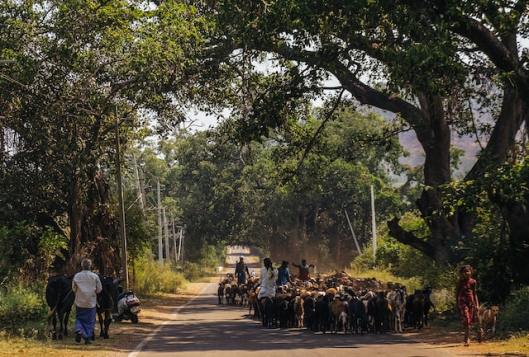 The economic growth of India since 1947 has been disappointingly low. Many countries—such as Hong Kong, South Korea, China—starting with comparable low levels of per capita GDP as India in the 1950s have over the last 75 years or so made phenomenal economic progress. Broadly speaking, those countries escaped poverty primarily because their political leaders were able to formulate and implement policies that promoted growth. In contrast to them, India stagnated. Continue reading “The Problem of Economic Growth – Part 1”
The economic growth of India since 1947 has been disappointingly low. Many countries—such as Hong Kong, South Korea, China—starting with comparable low levels of per capita GDP as India in the 1950s have over the last 75 years or so made phenomenal economic progress. Broadly speaking, those countries escaped poverty primarily because their political leaders were able to formulate and implement policies that promoted growth. In contrast to them, India stagnated. Continue reading “The Problem of Economic Growth – Part 1”
Category: Development
An Introduction to RISC (from the archives)

Time to revisit RISC — the development model that I proposed over 20 years ago. It was about helping the rural population develop so that they become urbanized. The solution to rural development is urbanization. The first step to urbanization is the development of rural people. That means providing them with services that help them increase their productivity.
The core insight is the importance of distinguishing between rural people and rural areas. We have to focus on the development of rural people and not on the development of rural areas. Quote: Continue reading “An Introduction to RISC (from the archives)”
Rising Equality
I can justifiably claim that equality is rising in the world. Meaning, the world used to be less equal than it is today, and that in the future it will become more equal than today. The reason that claim appears to contradict reality is that I have not specified the dimension for the comparison implicit in any measure of equality. When it comes to comparisons of material wellbeing, there are three distinct dimensions — consumption, income, and wealth.
My claim is that consumption equality is increasing, not wealth or income.
Here’s a trivial case that illustrates what I mean. Warren Buffet’s income and wealth is six orders of magnitude greater than mine. Meaning his wealth is measured in units of “000,000,000” and mine is measured in units of “000.” Billions as opposed to thousands. Similarly his income per year is measured in billions and mine in thousands. Certainly, compared to Buffet in terms of wealth and income, I am dirt poor. But I am not dirt poor compared to Buffet in consumption. Continue reading “Rising Equality”
Back to 1960s Nehruvian Socialist Poverty
Good news for Indians. Back to autarky. Back to grinding poverty.

Economic Growth, Population and Poverty Numbers
 I normally don’t do numbers. But in this post, I will have to refer to numbers because wealth and poverty have to be understood quantitatively too. So let’s do the numbers.
I normally don’t do numbers. But in this post, I will have to refer to numbers because wealth and poverty have to be understood quantitatively too. So let’s do the numbers.
It is an amazing fact that extreme poverty has fallen both in absolute and relative terms. The world’s population living in extreme poverty has dropped from 42% in 1981 to 11% in 2013. The world population was 4.5 billion in 1981, and 7.2 billion in 2013. Therefore in absolute numbers, extreme poverty numbers dropped from 1.9 billion to 0.8 billion. Over one billion people climbed out of extreme poverty, mostly in China. Good job, China. Continue reading “Economic Growth, Population and Poverty Numbers”
On the Distress of Indian Farmers – The Introduction
 Of the three major sectors of any economy, agriculture is the primary sector. It is prior in time and naturally enough forms the basis for the other two sectors — manufacturing and services. Without a solid foundation provided by an efficient agricultural sector, no society can prosper.
Of the three major sectors of any economy, agriculture is the primary sector. It is prior in time and naturally enough forms the basis for the other two sectors — manufacturing and services. Without a solid foundation provided by an efficient agricultural sector, no society can prosper.
Everybody — factory workers, quantum physicists, doctors, programmers, musicians, writers, politicians — needs food. Farming is the oldest occupation and all civilizations begin as essentially agrarian societies. Agricultural success is the necessary precondition for the advancement of civilization. Without an agricultural revolution there can be no avenues for social, technological, and economic development.
The claim of this essay is that India has not had a comprehensive agricultural revolution. All the other problems that India faces derive from that failure. The good news is that India has the opportunity to have an agricultural revolution. It has always had that opportunity. Primarily because of plain idiocy — let’s not sugarcoat this bitter fact — India has failed in progressing much beyond subsistence agriculture. India’s abysmal poverty follows relentlessly from that fact. Continue reading “On the Distress of Indian Farmers – The Introduction”
Which Countries Win the International Mathematical Olympiads
 I was asked on twitter how students of Indian origin do in the maths equivalent of the US spelling bee contests. (I had written a blog post on how students of Indian origin appear to have cornered the market on US spelling bee contests.)
I was asked on twitter how students of Indian origin do in the maths equivalent of the US spelling bee contests. (I had written a blog post on how students of Indian origin appear to have cornered the market on US spelling bee contests.)
@atanudey How do Indians do in the US Math Olympiads? Are they less, more or equally important to Spelling Bees? Just asking!
— speaksanskrit (@sanatanabhasha) July 24, 2016
I guess they do well in math too. I did a bit of searching on the web and here’s what I found. Continue reading “Which Countries Win the International Mathematical Olympiads”
Domestic Predation began in 1947
If you were an employer, and your employee was inefficient, incompetent, irresponsible and arrogant, you would fire him. There are other people who can do the job. If you were an employee, and the work was demeaning, the boss irascible, the pay miserly, you would quit. There are other jobs in other companies. If you were a customer, and the product was faulty, expensive, unreliable and badly designed, you would take your business elsewhere. There are other suppliers of goods and services. If you were in a partnership, and your partner was insulting, domineering, lazy and greedy, you would dissolve the partnership. We can associate with others. We all have the freedom to do the best we can and deserve our just deserts. But all bets are off when it comes to the government.
Continue reading “Domestic Predation began in 1947”
On Technology, Prosperity and Dysfunctional Ideologies
We take it as a given, almost a fact of nature like the seasons or the geography of continents, that different parts of the world enjoy different levels of prosperity. But there’s nothing “natural” about this since this is almost entirely within human control. The differences are stark, and at one end of the scale, heartbreaking. Consider the extremely rich first. Luxembourg has an annual per capita income of over $110,000, Norway over $100,000, Switzerland around $85,000. Those are small countries and outliers with perhaps little to tell us. But the US is large and has an annual per capita income of $53,000. Why is it so rich?
At the other end of the scale are Burundi and Malawi with only $200 or so annual per capita incomes. Why are they so poor? The richest countries are around 500 times richer in per capita terms than the poorest. What accounts for this inequality in incomes of countries? That question has engaged the attention of people for hundreds of years — starting with of course the great Scottish economist Adam Smith who inquired about “The Nature and Causes of the Wealth of Nations” in his famous 1776 book.
Continue reading “On Technology, Prosperity and Dysfunctional Ideologies”
A Misplaced Sense of Pride
One of the Founding Fathers of the United States, polymath, inventor, scientist, writer, diplomat, etc., etc., Benjamin Franklin (1706 – 1790) observed that “We are all born ignorant, but one must work hard to remain stupid.” An analogous statement about nations could be that all nations are born poor but it requires hard work to keep it in poverty. Not surprisingly that hard work is properly done by the politicians of poor countries. What’s surprising is the evident pride they appear to take in their dismal accomplishment. They obviously revel in the fact that the country is poor and proclaim it loudly for all to marvel at. A recent statement on twitter (image below) by the official spokesperson of the Ministry of External Affairs of India, retweeted over 1500 time no doubt approvingly by Indians, brought this to mind.
Continue reading “A Misplaced Sense of Pride”

